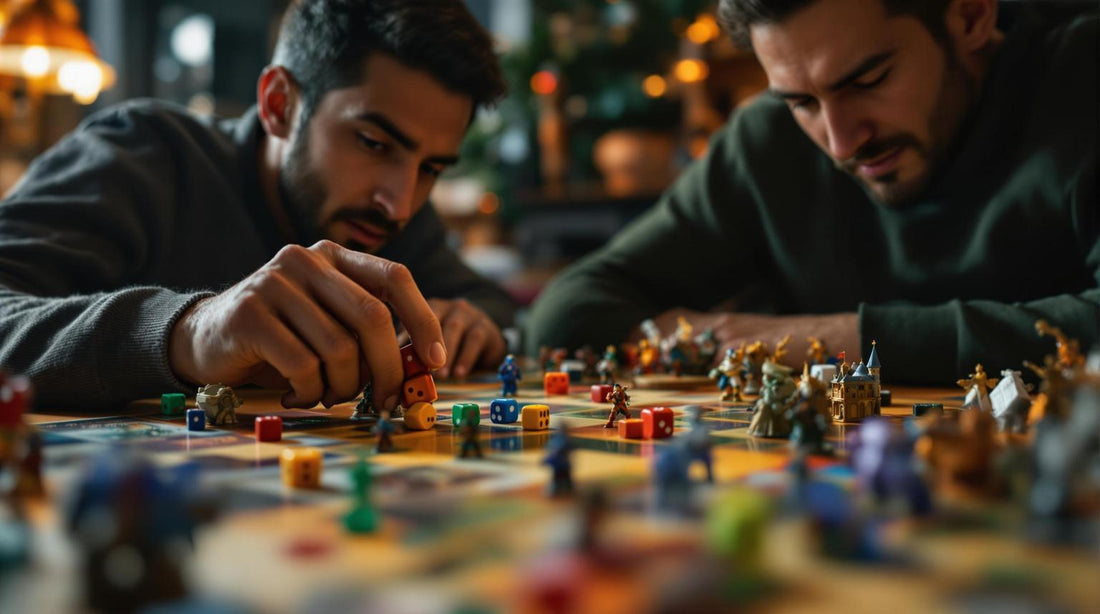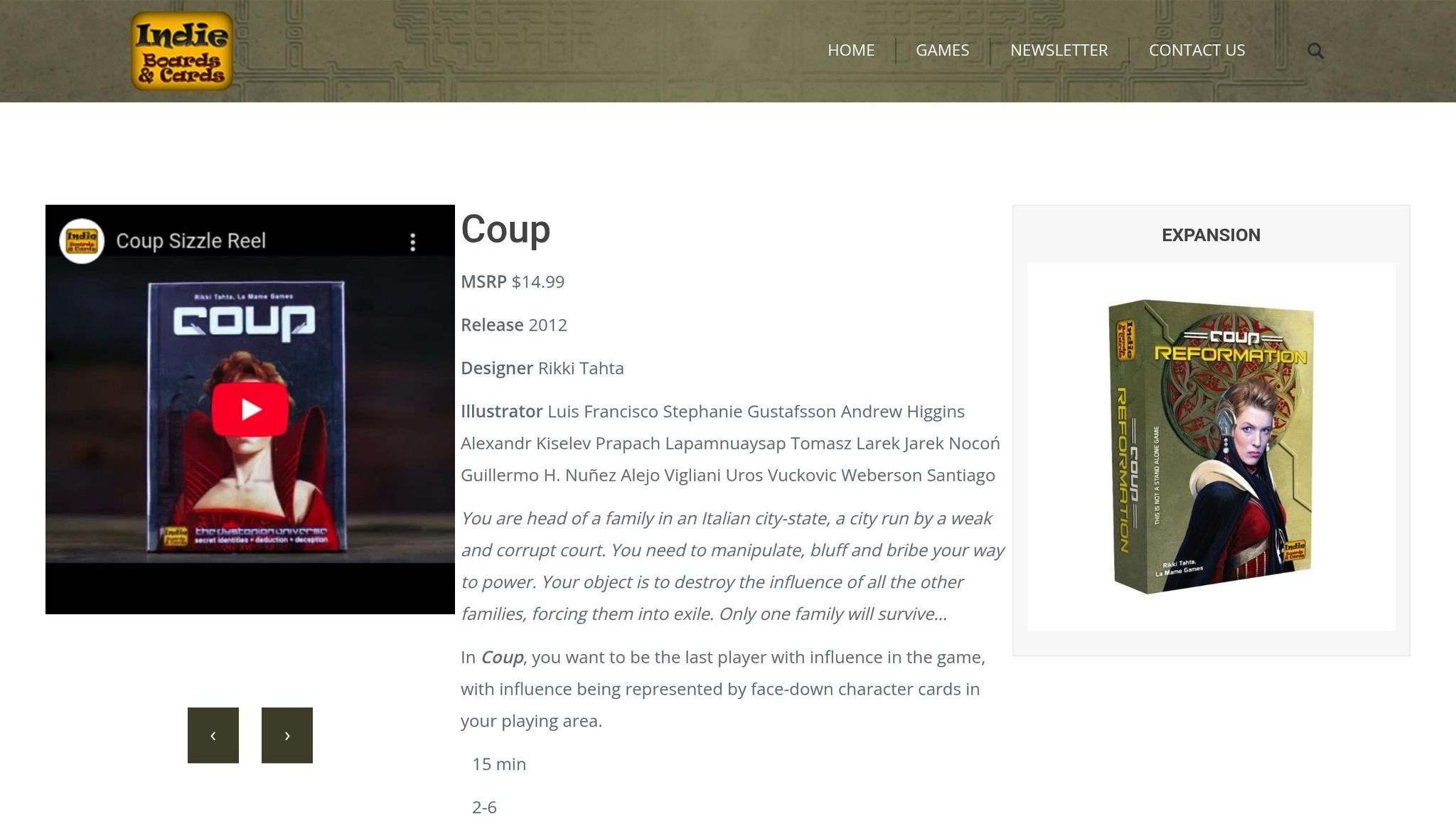Discover the Best Board Games for Every Player

How Bluffing Shapes Player Dynamics
Bluffing is a powerful tool in games, adding layers of strategy and social interaction. It influences decision-making, risk assessment, and group dynamics. Games like Poker, Coup, and Sheriff of Nottingham showcase different bluffing styles:
- Poker: Bluff through betting patterns, physical tells, and psychological tactics.
- Coup: Use role deception and challenges to outsmart opponents.
- Sheriff of Nottingham: Negotiate and mislead during inspections to sneak contraband or gain trust.
Quick Comparison
| Game | Bluffing Mechanic | Risk vs. Reward | Player Interaction |
|---|---|---|---|
| Poker | Betting and physical tells | Financial stakes | Limited verbal; focus on cues |
| Coup | Role deception and challenges | Loss of influence (elimination) | High verbal confrontation |
| Sheriff of Nottingham | Negotiation and inspections | Economic penalties/gains | Extensive negotiation |
Bluffing transforms simple rules into dynamic challenges, testing skills like deception, trust, and adaptability. Whether you're reading tells in Poker, claiming roles in Coup, or negotiating in Sheriff of Nottingham, mastering bluffing can give you a winning edge.
Related video from YouTube
1. Poker
Poker is the ultimate game of strategy and psychology, where bluffing plays a major role in outsmarting opponents. Let’s dive into the key strategies behind poker’s bluffing dynamics.
Using Betting Patterns to Bluff
Bet sizing and timing can be powerful ways to mislead opponents:
- Small bets (around 25-30% of the pot) can suggest weakness or a drawing hand.
- Large bets (75-100% of the pot) often signal confidence and strength.
- Keeping your bet sizes consistent across hands helps disguise your intentions.
Spotting Physical and Behavioral Tells
Skilled players keep an eye on subtle cues that might reveal the strength of an opponent’s hand:
- Breathing changes or irregular patterns.
- Hand movements, especially when handling chips.
- Shifts in speaking tone or patterns.
- How quickly or slowly decisions are made.
- Eye movements and facial expressions.
Managing Risk While Bluffing
Bluffing effectively requires careful planning and attention to detail:
- Position Matters: Acting later in a hand lets you observe your opponents’ actions first, giving you more control over decisions and pot size.
-
Reading the Board: Certain board textures make bluffs more believable. For example:
- Connected cards suggest possible straight draws.
- Suited cards open up flush bluff opportunities.
- High cards can make it easier to represent premium hands.
-
Player Profiles: Understanding your opponents is crucial:
- Aggressive players are tougher to bluff.
- Conservative players are more likely to fold under pressure.
- Tired or emotionally tilted players often make poor decisions.
The Role of Stakes and Psychology
The stakes of the game heavily influence bluffing strategies. At higher stakes (e.g., $5/$10 blinds or more), players tend to:
- Use more complex bluffing tactics.
- Pay closer attention to betting patterns and tells.
- Make decisions based on logic rather than emotions.
In poker, bluffing isn’t just about the cards - it’s about creating a believable story that confuses and misleads your opponents. This psychological element is what elevates poker into a game of skill and strategy.
2. Coup

Coup puts bluffing front and center, making deception the heart of its gameplay. Unlike poker, which relies on card combinations, Coup challenges players to outwit each other through role claims and social deduction.
Role-Based Bluffing
In Coup, each player holds influence cards representing specific characters. The twist? You can claim to have any character's ability - even if you don't actually have the card. But there's a catch: if someone challenges your claim and you're lying, you risk being eliminated.
Layers of Strategy
Coup thrives on its mix of hidden information and tactical decision-making:
- Hidden Roles: Only you know your cards, making every bluff a gamble.
- Action Choices: Each turn, you decide whether to act truthfully or bluff your way forward.
- Coin Management: Balancing your money while keeping your claims believable adds another layer of strategy.
The Challenge Mechanic
The challenge system in Coup creates intense psychological standoffs:
- Risk vs. Reward: Should you call out an opponent’s bluff or let it slide? Misjudging could cost you.
- Building Trust: Successfully defending your claim can make future bluffs more convincing.
- Table Dynamics: How players have acted in past games or earlier rounds often influences decisions.
Bluffing Through the Game Phases
Bluffing evolves as the game progresses:
- Early on, players tend to bluff cautiously while feeling out the table.
- The middle game sees bolder moves as players gain resources and confidence.
- By the end, with fewer players and exposed hands, every bluff becomes a calculated risk.
Social Interaction
Coup’s mechanics naturally shape the social atmosphere:
- Temporary alliances form based on trust - or shared suspicion.
- Observing others’ behavior becomes key to predicting their moves.
- Split-second decisions under pressure make for lively and unpredictable gameplay.
Coup masterfully combines simple rules with layers of bluffing and deduction, making every game a battle of wits.
sbb-itb-1ed942f
3. Sheriff of Nottingham

Sheriff of Nottingham brings a fresh twist to bluffing games with its merchant inspection mechanic. Instead of straightforward role-claiming like in Coup or reading hands as in poker, this game pits merchants against the Sheriff in a tense and strategic battle of deception.
The Inspection Mechanic
At the heart of the game is the inspection system, where merchants declare goods in their bags while trying to sneak contraband past the Sheriff. This creates multiple layers of bluffing:
- Playing It Safe: Truthfully declaring only legal goods.
- Bold Bluffing: Smuggling contraband while claiming it's legal.
- Reverse Bluffing: Declaring contraband while only carrying legal items to confuse the Sheriff.
Negotiation Tactics
Negotiation plays a big role, allowing merchants to sway the Sheriff through bribes, promises, or alliances:
- Offering money to avoid inspection.
- Trading future favors for leniency.
- Forming short-term alliances to pressure a strict Sheriff.
Psychological Pressure on the Sheriff
The Sheriff role comes with its own set of challenges and risks:
- Cost of Inspections: A wrong inspection costs the Sheriff money.
- Behavior Tracking: Watching for patterns in player actions.
- Risk vs. Reward: Weighing the potential value of contraband against the penalty for a mistake.
Merchant Strategies
Merchants can employ clever tactics to outwit the Sheriff and maximize their gains:
- Building Trust: Playing honestly at first to appear trustworthy.
- Hiding in Plain Sight: Using high-value legal goods to mask contraband.
- Conversation Tricks: Using table talk to misdirect suspicion.
Economic Consequences
The game's economy is shaped by the success or failure of bluffs. Smugglers profit from sneaking goods, but failed attempts result in confiscated items and fines. Meanwhile, incorrect inspections drain the Sheriff's funds.
Social Dynamics
Interactions between merchants and the Sheriff create evolving social patterns:
- Bluffing styles shift depending on who’s playing as the Sheriff.
- Negotiation strategies adapt as the game progresses.
- Group dynamics change as players track each other's successes and failures.
Sheriff of Nottingham blends bluffing, strategy, and social deduction into a thrilling experience. Each inspection becomes a high-stakes gamble, where psychology, economics, and calculated risks collide, keeping every player on edge.
Comparing Bluffing Effects
Drawing insights from games like Poker, Coup, and Sheriff of Nottingham, each offers distinct bluffing mechanics that shape player interactions and decision-making in unique ways.
| Game | Bluffing Mechanic | Decision Complexity | Risk vs. Reward | Player Interaction |
|---|---|---|---|---|
| Poker | Hidden information with betting | High – Multiple betting rounds and hand combinations | Direct financial stakes | Limited verbal interaction; focus on physical tells |
| Coup | Role deception with actions | Medium – Simple actions with complex social dynamics | Loss of influence (elimination) | High verbal interaction and direct confrontation |
| Sheriff of Nottingham | Cargo declaration and inspection | High – Multiple bluffing layers with negotiation | Economic penalties and gains | Extensive negotiation and deal-making |
This breakdown shows how each game's bluffing mechanics influence risk, decision-making, and social dynamics.
Core Mechanical Differences
The bluffing approach varies greatly across these games. Poker emphasizes probability and strategic betting. Coup revolves around claiming roles and challenging opponents' legitimacy. Meanwhile, Sheriff of Nottingham builds tension through inspections and negotiation.
Risk Structure
The way risk is managed differs significantly:
- Poker uses gradual betting to balance risk and reward.
- Coup creates high-stakes, all-or-nothing scenarios.
- Sheriff of Nottingham allows players to negotiate and reduce risk through deals.
Social Dynamics
The social interactions in these games are just as varied:
- Poker limits verbal interaction, focusing instead on reading physical cues.
- Coup thrives on direct confrontations and social pressure.
- Sheriff of Nottingham leans heavily on negotiation and deal-making.
Decision Complexity
Each game challenges players to make tough decisions:
- Poker requires analyzing hand strength, pot odds, and opponents' behavior.
- Coup demands maintaining role credibility and timing challenges effectively.
- Sheriff of Nottingham involves balancing inspection risks, reputation, and bribe offers.
Psychological Impact
These games also test different mental skills:
- Poker demands emotional control and patience.
- Coup requires adaptability in social interactions.
- Sheriff of Nottingham emphasizes negotiation skills and trust management.
Strategic Depth
The strategic layers in each game set them apart:
- Poker blends probability analysis with psychological tactics.
- Coup combines role deception with resource and influence management.
- Sheriff of Nottingham mixes economic strategy with social manipulation.
These varying bluffing mechanics showcase how game design can create diverse experiences while keeping the tension of deception and discovery at the heart of gameplay.
Conclusion
Bluffing mechanics in games like Poker, Coup, and Sheriff of Nottingham significantly shape strategy and player interaction. The psychological layers of bluffing create dynamic gameplay, drawing players back for more.
For game designers, here are some takeaways:
- Balance Risk and Reward: Create stakes that make both successful and failed bluffs impactful. Poker's betting system is a great example of this balance.
- Incorporate Social Dynamics: Use multiple interaction channels to deepen player engagement.
- Adjust Complexity Over Time: Design bluffing systems that grow more intricate as players gain experience.
Players, on the other hand, can improve their strategies by focusing on:
- Building a Credible Image: Establish trust early to set up stronger bluffs later.
- Keeping Opponents Guessing: Avoid predictable behavior to improve bluffing success.
- Observing Opponents: Pay close attention to patterns and tendencies at the table.
The ever-changing nature of bluffing ensures no two games are alike, adding layers of psychological depth. By applying these principles, both designers and players can elevate their approach to bluffing in games.






